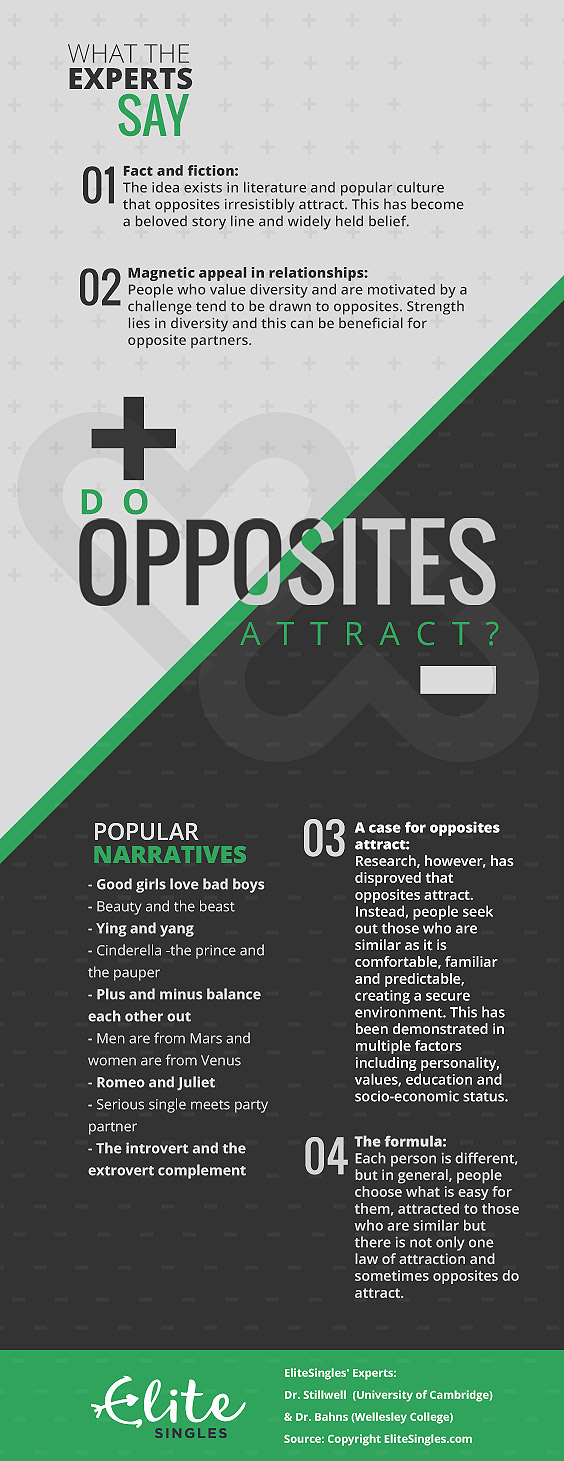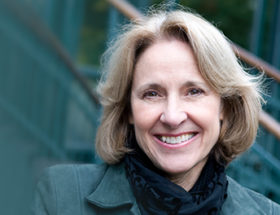It’s a common assumption that all relationships go through similar phases, but are the stages of dating really the same for everyone?
The accepted concept that opposites attract has pervaded popular culture and societal thinking to the point that it is now a commonly held belief. However, today a growing base of research has explored and deconstructed this legend. We explore the outcomes and weigh in with the experts to see if opposites do really attract, or repel, in relationships.
From Billy Joel crooning about an uptown girl wanting a downtown man, Pretty Woman, the star-crossed lovers Romeo and Juliet, Beauty and the Beast, the Cinderella fairytale, and many more, we have been told this story of opposite attraction across multiple mediums as varying as Shakespearean literature to Disney movies.
The irresistibly romantic tale of unlikely love beating the odds has become a beloved storyline and has turned into a widely held belief which explains this social and natural phenomenon. But that is also how we describe a myth. The problem with a myth is that the facts are often unsubstantiated, based rather on populous opinion, easy to believe but lacking the evidence to validate it.
Magnetic appeal: do opposites really attract in relationships?
To get to the bottom of the mystery of do opposites really attract, we brought in some heavy-hitting experts. Speaking to EliteSingles, Dr. David Stillwell, Deputy Director of Psychometrics at the Cambridge Judge Business School at the University of Cambridge and Dr. Angela Bahns, Professor of Psychology at Wellesley College, unpack their insight from leading research studies in psychology and attraction in today’s world of dating and relationships.
Dr. Stillwell, co-author of the study Birds of a feather do flock together: behavior-based personality assessment method reveals personality similarity among couples and friends, investigated personality similarities, using behavior and language in romantic partners and friends on social media. He explained to EliteSingles that up to this point there was evidence for similarity in partners across age, education and socio-economic level, intelligence and values; however, similarity had not yet been established in personality traits.
Using the Big Five Model of Personality, the study tracked the digital activities of 295 320 participants on Facebook to measure their similarities and differences. When answering our question do opposites really attract, looking at personality is a fundamental psychological construct in appeal and relationships.
The Big Five Model of Personality is the leading personality model in academic research, measuring traits across five dimensions: openness to experience, conscientiousness, extroversion, agreeableness, and neuroticism. The unique contribution of this study is that previous research relied on peer and self-reported questionnaires to measure and compare personality traits, whereas, in this study, the individuals’ behavior was analyzed, removing the ‘reference group effect’ of comparing oneself to other individuals in your environment. By circumventing this limitation, they were able to demonstrate a new and more accurate result.
What the study conclusively found is that opposites do not actually attract, rather that there was a significant similarity in personality between friends and romantic partners3, dispelling the myth that opposites attract with scientific research taken directly from today’s online social environment. Dr. Stillwell told EliteSingles, “Our unique contribution was to show that when you measure personality based on behavior (what people talk about online, or what they ‘like’ on Facebook), that personality is similar after all”2, concluding that birds of a feather do indeed flock together.
Taking a look at the question of opposite attraction in relationships from a different angle we also chatted to Dr. Bahns on the matter of do opposites really attract or not. She is a researcher and co-author in the study Similarity in relationships as a niche construction: Choice, stability, and influence within dyads in a free choice environment, which investigated similarity in interacting pairs across a range of factors, from values to recreational activity. The research showed that the pairs in the study largely shared similar views and confirmed that like-minded individuals are attracted to each other. She explains “similarity-seeking in relationships is goal-driven, and for many people, choosing on the basis of similarity satisfies their goals of comfort, familiarity, and predictability”.
Summing up the expert opinion and research findings, the legend of opposite attraction has been discredited. In reality, behavioral interactions and personality traits in attraction are not driven, like the positive and negative charges of a magnet by attracting the opposite, but rather in relationships differences can repel, making true the adage like attracts like.
A case for opposites attract: plus and minus can equal love
Although a majority of the time people are drawn to others who are similar to themselves, there is still a case to be made for when opposites attract in love and relationships. Emotions, behavior, and relationships are far too complex to apply one law of attraction to all and there are exceptions to every rule. So when do opposites attract?
Dr. Bahns says that although similarity-seeking is extremely common, some people do seek out relationships with people who are different to them. Individuals are motivated by unique drives, different personalities find diverse traits appealing, and varied relationship environments interesting. It is part of what makes up a multicolored continuum of the human experience, rather than existing only in a monochrome predictability of black and white rules of engagement.
Explaining that values and motivation are two key factors when opposites can attract, Dr. Bahns said: “my research shows that people who value diversity and recognize the benefits diversity has to offer are more likely to choose friends and partners that are different from them”. She goes on to explain that some people are motivated to do something different than what is easy or comfortable, and for these people, opposites may attract.
Also making a case for when opposites attract in relationships Dr. Stillwell confirmed that it’s important for us to be challenged by other perspectives, and for others’ strengths to complement our weaknesses. This highlights the strength which lies in diversity and the benefits of relationships with people different to you, opening up new ways of thinking, cultures, ideas and experiences.
Even though research has shown that opposites do not habitually attract each other in social interactions, this exists on a spectrum and is not a hard and fast rule. “We’re not saying that an extrovert will never marry an introvert. Surely we wouldn’t all want to date our clone”, clarifies Dr. Stillwell.
The formula of opposites attract
Working out the forces behind the laws of attraction and investigating do opposites really attract or not, there is not one clear-cut conclusion. The myth that opposites attract has spread throughout love stories and become a familiar hook in popular culture. The narrative of overcoming the odds appeals to the human spirit and keeps us on the edge of our seat.
Looking at why it has become so popular Dr. Stillwell remarks that opposites attracting makes for a good story; the pauper marrying a prince is a classic yarn. Plenty of TV shows have stories about opposites attracting because it’s ripe for drama. It is perhaps the sheer unlikelihood of two completely different individuals, poles apart, loving each other enough to overcome the conflict of difference that we find so appealing. This idea gives us hope, hope that love can overcome all odds. But perhaps this exists more in a realm of fairytales then real life.
Across numerous research studies by leading academics and social scientists, the research has unequivocally established that opposites do not attract and that people are rather drawn to those who are similar to themselves. This explains the natural and common attraction between like-minded singles and couples.
Dr. Bahns confirms that when people are left to do what comes naturally to them or what is easy, they usually choose to be with people who are similar to them. Familiarity creates security and also confirms one’s own views, identity, and understanding by experiencing it in a dyad, seeing your own reflection in your partner. People like to be with others who are like them because this helps create a social environment that is safe, stable, and satisfying, explains Dr. Bahns.
There are still examples and occasions though when opposites do attract and the subject is multifaceted. We found that similar people attract, on average. However, perhaps the story is more nuanced. Perhaps there is an ideal level of similarity for a successful couple so that the couple challenges each other without it becoming too fraught. Perhaps we like to date and have flings with people different from us, but marry, or make long term commitment, to people who are similar to us, concludes the expert opinion of Dr. Stillwell.
It appears that the alluring excitement of the unknown stimulates the appeal when opposites do attract, but it is the comforting confirmation of similarity that is ultimately what a confirmed majority gravitate towards in lasting love and relationships.






 English
English French
French